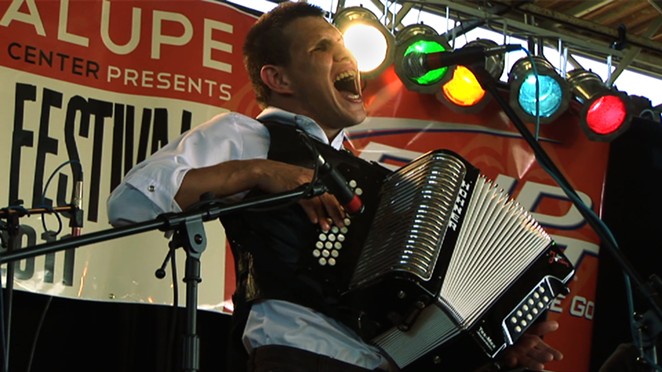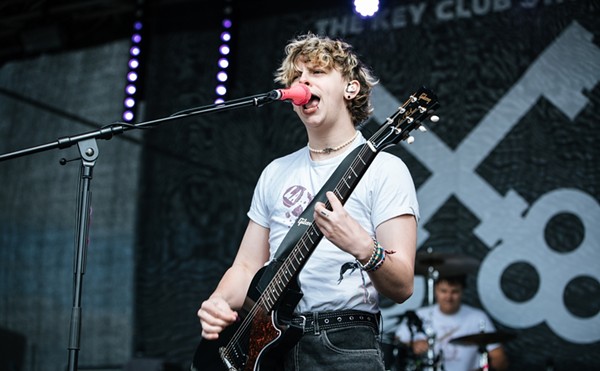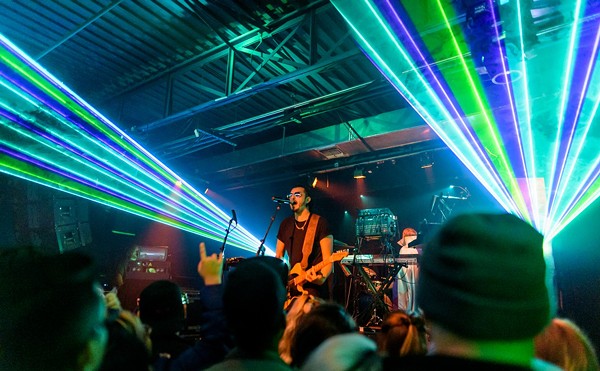New documentary Juanito’s Lab chronicles the growth and struggles of a San Antonio musical prodigy
By Sanford Nowlin on Fri, Jul 2, 2021 at 1:30 pm
It’s a wave; that’s the way my music comes when we play,” San Antonio musician Juanito Castillo says at the opening of Juanito’s Lab, a new film documenting 15 years of his life. “It’s a wave when we jam. It hits you, and it keeps hitting you.”
As viewers watch the nearly two-hour documentary unfold, they’re likely to experience a similar feeling. Blind nearly from birth, the 32-year-old Castillo got his start as a conjunto child prodigy, but the film chronicles his effort to chart a new musical course — a quest that’s at once restless, invigorating and unrelenting.
A labor of love for married filmmakers Guillermina Zabala and Enrique Lopetegui — the latter of whom once worked as the Current’s film and music editor — Juanito’s Lab will make its debut at San Antonio’s CineFestival.
Castillo was born prematurely, his retinas burned after he was placed in an incubator. Despite that disability, his parents demanded his independence and encouraged him to pursue his early gift with music.
After singing in front of crowds at Market Square while in elementary school, Castillo went on to master more than a dozen instruments, including the accordion, guitar, bass, bajo sexto and drums. The film’s titular lab is a casita behind the Castillo family home where the musician continuously toiled to unlock the next stages in his artistic evolution.
Early in the film, it becomes clear that Castillo struggles with societal expectations. His aspirations and abilities extend to jazz and other music, so he feels constrained as others urge him to stick with Tejano and conjunto. In a telling moment, a teenaged Castillo vents to the camera about the matching “cowboy clothes” he’s forced to wear onstage.
As a young adult, Castillo also bristles against expectations that he carry on the legacy of the late Esteban Jordan, the revered accordion pioneer who mentored him along the way. Castillo spent two years playing drums for Jordan, who was also severely visually impaired.
Even a later opportunity for Castillo to cut an album with Grammy-winning bajo sexto player Max Baca doesn’t quite offer the musical freedom the young musician is after. He confides to Lopetegui on camera that the still-unreleased project feels too much like Baca’s baby.
Because Juanito’s Lab follows a subject still spreading his artistic wings, its narrative arc deviates from that of the standard long-form music documentary. More often, filmmakers turn their cameras on musicians who have already formed their sound and achieved some degree of success.
The less-charted path taken by the makers of Juanito’s Lab may prove frustrating for viewers looking for a tidy story about an artist’s climb to success. Without inserting spoilers, the film’s climax and conclusion suggest that one of Castillo’s biggest wins so far in life may, in fact, lie outside of music.
Even so, the directors’ organic approach brings a sense of authenticity to the project. Castillo’s creative restlessness is on full display, and in the end, the viewer is unsure whether he’ll ever be fully satisfied.
Juanito’s Lab works best when it lets the music speak for itself — as in a dumbfounding clip from an outdoor performance in which Castillo unleashes a freewheeling jazz improvisation on a bajo sexto, scat-singing along with his own spontaneous creation.
In perhaps the documentary’s most powerful moment, Castillo gets the opportunity to travel to LA to jam with prolific Argentine producer and composer Gustavo Santaolalla. If that name sounds familiar, it’s likely because Santaolalla won back-to-back Oscars for his scores to Brokeback Mountain and Babel.
The viewer is set up for low expectations when one of Santaolalla’s associates warns the filmmakers that if the maestro isn’t feeling the session, they’ll know within five minutes. Instead, joy lights up Santaolalla’s face as he and the young accordionist trade licks. Their jam session stretched on for four hours, according to the filmmakers.
For longtime San Antonio music fans, the documentary is likely to inspire fits of nostalgia. The footage includes multiple clips from Saluté International Bar, the long-gone St. Mary’s Strip venue that played host to Jordan and other Tejano greats. Saluté’s former owner, Azeneth Dominguez, even weighs in on Castillo’s artistry.
In the end, the documentary is a fascinating portrayal of a questing artist and a largely undiscovered musical genius. There’s no guarantee Castillo will fully realize what he hears inside his head, or that he’ll finally be recognized for his brilliance.
But, with any luck, Juanito’s Lab could help with the latter.
Stay on top of San Antonio news and views. Sign up for our Weekly Headlines Newsletter.
As viewers watch the nearly two-hour documentary unfold, they’re likely to experience a similar feeling. Blind nearly from birth, the 32-year-old Castillo got his start as a conjunto child prodigy, but the film chronicles his effort to chart a new musical course — a quest that’s at once restless, invigorating and unrelenting.
A labor of love for married filmmakers Guillermina Zabala and Enrique Lopetegui — the latter of whom once worked as the Current’s film and music editor — Juanito’s Lab will make its debut at San Antonio’s CineFestival.
Castillo was born prematurely, his retinas burned after he was placed in an incubator. Despite that disability, his parents demanded his independence and encouraged him to pursue his early gift with music.
After singing in front of crowds at Market Square while in elementary school, Castillo went on to master more than a dozen instruments, including the accordion, guitar, bass, bajo sexto and drums. The film’s titular lab is a casita behind the Castillo family home where the musician continuously toiled to unlock the next stages in his artistic evolution.
Early in the film, it becomes clear that Castillo struggles with societal expectations. His aspirations and abilities extend to jazz and other music, so he feels constrained as others urge him to stick with Tejano and conjunto. In a telling moment, a teenaged Castillo vents to the camera about the matching “cowboy clothes” he’s forced to wear onstage.
As a young adult, Castillo also bristles against expectations that he carry on the legacy of the late Esteban Jordan, the revered accordion pioneer who mentored him along the way. Castillo spent two years playing drums for Jordan, who was also severely visually impaired.
Even a later opportunity for Castillo to cut an album with Grammy-winning bajo sexto player Max Baca doesn’t quite offer the musical freedom the young musician is after. He confides to Lopetegui on camera that the still-unreleased project feels too much like Baca’s baby.
Because Juanito’s Lab follows a subject still spreading his artistic wings, its narrative arc deviates from that of the standard long-form music documentary. More often, filmmakers turn their cameras on musicians who have already formed their sound and achieved some degree of success.
The less-charted path taken by the makers of Juanito’s Lab may prove frustrating for viewers looking for a tidy story about an artist’s climb to success. Without inserting spoilers, the film’s climax and conclusion suggest that one of Castillo’s biggest wins so far in life may, in fact, lie outside of music.
Even so, the directors’ organic approach brings a sense of authenticity to the project. Castillo’s creative restlessness is on full display, and in the end, the viewer is unsure whether he’ll ever be fully satisfied.
Juanito’s Lab works best when it lets the music speak for itself — as in a dumbfounding clip from an outdoor performance in which Castillo unleashes a freewheeling jazz improvisation on a bajo sexto, scat-singing along with his own spontaneous creation.
In perhaps the documentary’s most powerful moment, Castillo gets the opportunity to travel to LA to jam with prolific Argentine producer and composer Gustavo Santaolalla. If that name sounds familiar, it’s likely because Santaolalla won back-to-back Oscars for his scores to Brokeback Mountain and Babel.
The viewer is set up for low expectations when one of Santaolalla’s associates warns the filmmakers that if the maestro isn’t feeling the session, they’ll know within five minutes. Instead, joy lights up Santaolalla’s face as he and the young accordionist trade licks. Their jam session stretched on for four hours, according to the filmmakers.
For longtime San Antonio music fans, the documentary is likely to inspire fits of nostalgia. The footage includes multiple clips from Saluté International Bar, the long-gone St. Mary’s Strip venue that played host to Jordan and other Tejano greats. Saluté’s former owner, Azeneth Dominguez, even weighs in on Castillo’s artistry.
In the end, the documentary is a fascinating portrayal of a questing artist and a largely undiscovered musical genius. There’s no guarantee Castillo will fully realize what he hears inside his head, or that he’ll finally be recognized for his brilliance.
But, with any luck, Juanito’s Lab could help with the latter.
Stay on top of San Antonio news and views. Sign up for our Weekly Headlines Newsletter.
Tags:
- San Antonio,
- Texas,
- Juanito Castillo,
- Juanito’s Lab,
- film,
- documentary,
- movie,
- Guillermina Zabala,
- Enrique Lopetegui,
- Guadalupe Cultural Arts Center,
- CineFestival,
- film festival,
- jazz,
- Tejano,
- conjunto,
- musician,
- blind,
- blind musician,
- prodigy,
- Saluté International Bar,
- St. Mary's strip,
- Azeneth Domingue,
- Max Baca,
- Gustavo Santaolalla,
- Esteban Jordan,
- bajo sexto,
- accordion,
- guitar,
- bass,
- drums

KEEP SA CURRENT!
Since 1986, the SA Current has served as the free, independent voice of San Antonio, and we want to keep it that way.
Becoming an SA Current Supporter for as little as $5 a month allows us to continue offering readers access to our coverage of local news, food, nightlife, events, and culture with no paywalls.
Scroll to read more Music Stories & Interviews articles
About The Author
Newsletters
Join SA Current Newsletters
Subscribe now to get the latest news delivered right to your inbox.


















